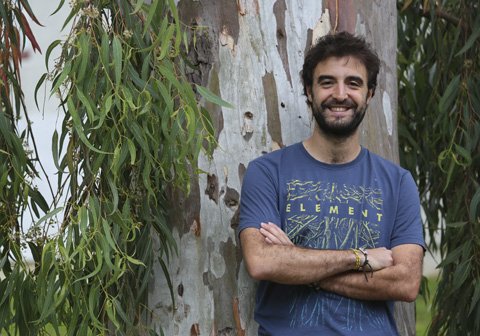A study by the Department of Plant Biology and Ecology of the UPV/EHU-University of the Basque Country reveals that the effects of climate change, in this case the lack of water, on water systems together with the presence of eucalyptus plantations are changing the metabolism of these systems. According to Aingeru Martínez, one of the authors of the study, it is further evidence of the alteration of nutrient cycles globally.
Human activity alters nutrient cycles
The metabolism of water systems is being altered on a global scale by lack of water and eucalyptus plantations, according to a study by the UPV/EHU
First publication date: 26/07/2017

Temperature increase is, normally, the most noteworthy aspect of climate change; yet it is not the only one. Variations in water level constitute another aspect to be taken into account. According to Aingeru Martínez, one of the researchers who has carried out this study, "we are seeing increasingly more pronounced and prolonged periods of water shortage in water systems, and this is normal in dry and Mediterranean systems; but it is also taking place in temperate regions such as our own. It is important to find out what impact this is having on water ecosystems".
The study also considers the effect on water systems caused by the monoculture plantations of Eucalyptus grandis, one of the tree species most widely planted in the world. And the fact is that eucalyptus leaves, once submerged, transfer dissolved organic matter to the water, "something similar to what happens when we make an infusion," he explained. That is how leaf litter leachates are produced, and in the case of the eucalyptus, "they are highly recalcitrant, rich in complex secondary compounds and oils that biological communities find difficult to metabolise; and they may even be toxic", explained Martínez. "We felt it was important to bring these two aspects together: firstly, the way in which the water shortage may be affected, and secondly, the fact that water systems are surrounded by eucalyptus plantations," he added.
The importance of biofilm
The research focussed on the analysis of the above-mentioned effects on biofilm, "the green scum we can see on stones in rivers and reservoirs," explained Martínez. Biofilm is one of the basic components of trophic chains, and "it plays a key role not only in the biogeochemical cycle of the dissolved organic matter but also in the transfer of matter, nutrients and energy to higher trophic levels. Thus, alterations in biofilm metabolism could cause a domino effect, and affect the functioning of freshwater ecosystems," confirmed Aingeru Martínez.
To be able to see what effects leaf litter leachates have on biofilm, they conducted an experiment in which they submerged artificial substrates colonised by biofilm in five different concentrations of E. grandis leachates "in order to simulate the concentrations that can be found in natural systems depending on the severity of the water shortage". The effects on growth, respiration, primary production, nutrient concentration and exo-enzymatic activity were measured. "The most significant effects were seen on respiration and primary production. This alters the metabolism of the community as it becomes more heterotrophic, in other words, more oxygen is consumed and more CO2 is released into the atmosphere."
So due to the importance of biofilm in the functioning of freshwater systems, "the periods of water shortage together with the presence of large eucalyptus plantations can be said to alter the metabolism and, therefore, the functioning of freshwater systems on a global scale. Bearing in mind the importance of freshwater systems in the carbon cycle globally, it would be further evidence that our activities are causing changes in nutrient cycles across the world."
Additional information
This piece of research published in the prestigious scientific journal Science of the Total Environment is the outcome of an international internship at Florida International University of (FIU) by Aingeru Martínez-Gómez, lead author of the article and researcher in the UPV/EHU's Department of Plant Biology and Ecology.
Bibliographic reference
- "Leaf-litter leachate concentration promotes heterotrophy in freshwater biofilms: Understanding consequences of water scarcity".
- Science of the Total Environment (2017; Vol. 599–600: Pages 1677–1684).
- DOI: 10.1016/j.scitotenv.2017.05.043

